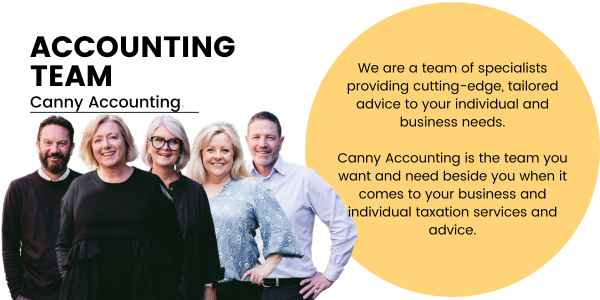GST On Property Sales
Written by: Accounting Team
One common question we get here at Canny Accounting is:
“Do I have to pay GST when I sell my property?”
And one common error we also get here at Canny Accounting is:
“Oops! We’ve discovered that we must pay GST on our property sale, but we didn’t know… and now we must fund the GST payment out of our own pocket!”
As accountants who care deeply about our clients, we much prefer our clients to fall into the common question rather than the common error.
Do I Need To Register For GST When I Sell My Property + Why?
The answer, as we always seem to say, is – it depends, and it is not straightforward.
You do not include GST in the sale of residential premises that are not new residential premises. New residential premises are, generally, residential premises that have not previously been sold.
You would need to consider GST registration when you sell:
- Commercial premises;
- Commercial residential premises; and
- New residential premises.
It is important to note that we write “consider GST registration” because GST registration is not always required with these sales.
One common trap for taxpayers is to focus immediately on the GST classification of a transaction (e.g. whether a supply is taxable, input taxed or GST-free) rather than to consider the general rules contained within the A New Tax System (Goods and Services Tax) Act 1999 (“GST Act”) and the A New Tax System (Goods and Services Tax) Regulations 2019 (“GST Regs”). Essentially, this means that lots of taxpayers get lost “in the woods”.
Section 9-5 of the GST Act provides the structure for analysing for the GST implications of a transaction (“the woods”), but the two main questions to ask yourself are:
- Is the supply made in the course of furtherance of an enterprise that you carry on; and
- Are you registered for GST, or are you required to be registered?
While the other considerations are important, the answer to these two questions will help determine if you need to include GST in the sale price.
Example Scenario
You will be carrying on an enterprise if you build a new residential property and sell it immediately.
In this situation, you will also be required to register for GST if the sale is more than the GST registration turnover threshold of $75,000. Conversely, if you build a new residential property and live in it for longer than two years, then sell it, you would not be carrying on an enterprise and would not need to register for GST.
When you are considering selling your property, make sure to make a time to speak to your accountant – we can help determine when you are required to be registered for GST (and when you don’t!).
How Much GST Do I Pay?
GST is a broad-based tax of 10% on top of the price of most goods, services and other items sold or consumed in Australia. Note that it is a legal requirement in Australia that GST is included in the sale price, so it shows as a single figure.
If you are required to be registered for GST, it must be shown in the price of the property. For example, if the sale price of your property is $1,100,000, the GST that must be remitted to the Australian Taxation Office (ATO) is $100,000.
Another alternative way to calculate GST on a sale of a property is using the Margin Scheme. Under the Margin Scheme, you calculate and pay GST based on the margin between the purchase price and the sale price of the property. Not everyone can use the Margin Scheme, so make sure to speak to your accountant before you purchase the property.
When Do I Need To Pay GST When Selling My Property?
Usually, when a taxpayer is registered for GST, the taxpayer will remit the GST to the ATO on a monthly, quarterly or yearly basis after lodging their business activity statement (BAS).
However, in some circumstances, you may need to pay GST at settlement when selling new residential premises or residential land. This is done at settlement by withholding the GST amount and remitting it directly from the purchaser to the ATO. A GST property credit is then applied to your account and will be offset against the next activity statement that you lodge.
Can You Minimise The Amount Of GST You Pay?
As shown above, GST is a broad-based tax. You collect GST as a GST-registered entity and remit it to the ATO on a regular basis. In turn, you can claim a credit for GST included in the price you pay for expenses that relate to the side.
For instance, if you and your accounting decide that you must register for GST and include GST in the price of selling newly built residential premises, you can claim the GST you’ve paid on the build costs. If you sell a property for $1,100,000 including GST and spend $880,000 including GST on the costs of building the property, you will pay a net total of $20,000 in GST to the ATO being $100,000 of GST on the sale, less $80,000 of GST on the build costs.
What Kind Of Properties Require GST To Be Paid On Sale?
As stated above, GST may be included in the sale of commercial premises, commercial, residential premises and new residential premises, but this is not always the case.
If it is determined that you are not carrying on an enterprise or that you are not required to be registered for GST, then you do not include GST in the sale price.
Understanding GST obligations when selling a property is crucial to avoid unexpected outcomes. This can be tricky and difficult to determine, so make sure you always discuss it with your accountant before making any decisions. It’s not always easy to be prepared for unexpected outcomes, but we can help!
Canny Accounting + Professional Tax Advice
Having an accountant’s expert knowledge on hand during the process of selling, or even buying, a home is a factor that often can’t be overlooked.
We emphasise professional tax advice, minimising overall tax obligations and increasing your potential tax savings, as well as a deeper understanding of the taxes you might have to pay.
Canny Accounting will work with you to identify your opportunities that take your personal and business circumstances into account, developing a strategy tailored for you and your business.
Get in touch with our team to discuss how we can start putting some strategies in place to better your tax position now and for the coming years.





